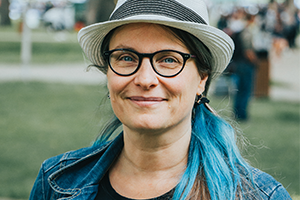
SSHRC Insight Grant announced for STM Professor
Dr. Sharon Wright (PhD), professor of history for St. Thomas More College (STM), and Dr. Frank Klaassen, (PhD) are co-principal investigators of a new SSHRC grant.
Congratulations Dr. Sharon Wright (PhD) - Department Head, History, St. Thomas More College(STM).
Dr. Wright is the co-Principal Investigator on a successful application with Dr. Frank Klaassen, PhD (USask history department). They have been granted a $212,809 Social Sciences and Humanities Research Council (SSHRC) Insight Grant for their project “Female Magic Practitioners 1350-1550”.
(USask release excerpt)
Exploring the historical role of female magic practitioners
Despite popular representations of witches, real female magic practitioners were rarely accused of witchcraft. In the Essex witch trials during the reign of Queen Elizabeth I, for example, only three percent of those accused were actually magic practitioners. These practitioners were more commonly understood as protections from witchcraft.
“In comparison to the hundreds of monographs on the unusual hot spots of the witch trials, and despite the fact it is estimated that hundreds of thousands were operating at any given time, not a single credible academic book deals with the female magic practitioner of pre-modern Europe,” said Dr. Frank Klaassen (PhD), professor of history in USask’s College of Arts and Science. He and Dr. Sharon Wright (PhD), professor of history in St. Thomas More College, are co-principal investigators of a new SSHRC Insight grant in the amount of $212,809.
Their research will investigate female magic practitioners from 1350-1550. It will include a close study of late medieval ecclesiastical courts in England, focused studies on known female practitioners, and a broad-based comparative survey of female practitioners in Western and Central Europe. Who were these women? What sorts of things did they do? How did they compare to male practitioners? And how and when did the church seek to regulate their activities?
The results of this project will include not only conventional scholarly outputs, but also public history outputs such as historically based games and an online museum exhibition featuring known female practitioners, the manuscript evidence for their activities, and even 3D vectors of the tools they used. Much of the funding will also support graduate and undergraduate student training, research, and research outputs.
